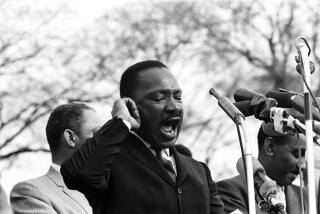The Ultimate Affirmation of Conservatism : The Million Man March signals the final dismantling of the Great Society.
- Share via
The consensus that once supported the social welfare state is no more. Martin Luther King Jr.’s “I have a dream” speech was delivered from the steps of the Lincoln Memorial; it is fitting that Louis Farrakhan’s “day of atonement” oration was delivered from the Capitol, at the opposite end of the Mall. Symbolic bookends for an era: The 1963 rally anticipated the legislation that built the Great Society; Monday’s assembly coincides with the dismantling of Lyndon Johnson’s anti-poverty edifice.
President Clinton, in his reelection mode, seems content to go with the new flow; he talks of “mending, not ending” failed programs, but then he says he will sign a welfare bill that would end the federal government’s entitlement guarantee. House Speaker Newt Gingrich promises to “replace” the status quo with a “conservative opportunity society,” but after nearly a year of controlling Congress, his Republicans show little interest in a Jack Kemp-like empowerment agenda for the poor. And even Farrakhan, for all his emphasis on self-help, has not come up with a workable economic vision.
Two points about the Million Man March:
First, it was Farrakhan’s day. In addition to the usual political suspects, the podium was graced by poets, musicians and even a few aged veterans of the 1960s civil rights movement. But to an observer amid the throng, it was obvious that the multitude had come to answer his call. Indeed, if one accepts the police estimate of 400,000 marchers, then some 2.5% of all the African American males in the country were in Washington on Monday. What white leader could attract 1/40th--nearly 3 million--of all the white men in the nation?
Second, while many listeners were no doubt befuddled by Farrakhan’s disquisitions on numerology and the Sphinx’s nose, his words had power. “Black man, we’ve got to stop what we’re doing,” he said. “We cannot continue the destruction of our lives and the destruction of our community.” Farrakhan’s genius is his ability to insinuate moralism into a slangy, streetwise message that makes good behavior seem like the ultimate act of defiance. “Every time we drive-by shoot, every time we carjack, every time we use foul, filthy language,” he said, “we are feeding the degenerate mind of white supremacy.”
So is Farrakhan the leader who can bring about a great awakening among African Americans? No. For all his protestations about misquotation, he has said too many hurtful things. Furthermore, while Farrakhan’s emphasis on abstention and personal responsibility may bolster the preconditions for black advancement, his retrograde economic ideas would still leave blacks poor. Nastiness aside, his references to Jewish and Asian entrepreneurs as “bloodsuckers” bespeak a counter-productive hostility to the proven process of wealth creation. No group of people can flourish without capital. For poor people, internal savings can begin the process of capital accumulation, but significant investment infusions must come from outside. Since today’s government is in no mood to transfer wealth, that leaves the market as the only significant source. And capital only goes where it is welcomed; if investors feel threatened, they can put their money into some other city, country or continent.
Part of the answer to the challenge of globalization must come from a revival of older black traditions. Booker T. Washington, the former slave who founded Alabama’s Tuskegee Institute, dedicated his life to self-help and thrift. Yet at the turn of the century, he lost the battle for black opinion to W.E.B. DuBois, one of the co-founders of the NAACP, who favored a more political, rights-based approach.
Four years ago, in an interview with Rolling Stone magazine that attracted little attention, film director Spike Lee said, “Black people for too long haven’t really thought of owning businesses.” Lee was asked point-blank: Are you a capitalist? He answered, “I’ve always tried to be in an entrepreneurial mode of thinking. Ownership is what’s needed amongst African Americans.”
Farrakhan is right when he argues that black salvation has little to do with the level of government spending and everything to do with the hearts, minds and souls of black people. But Washington, Lee and many others take the matter one step further: African Americans will never be truly free until they can integrate themselves into the larger world economy.
More to Read
Sign up for Essential California
The most important California stories and recommendations in your inbox every morning.
You may occasionally receive promotional content from the Los Angeles Times.













